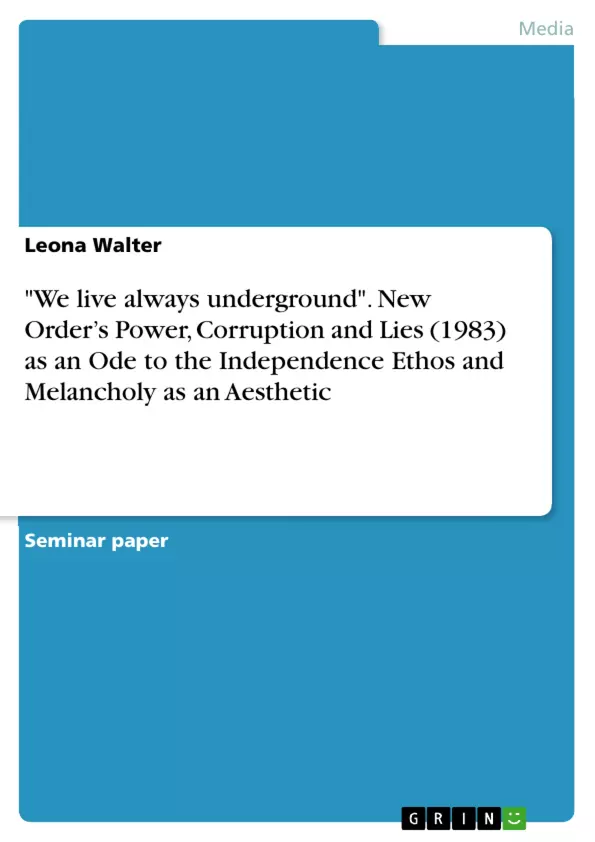Power, Corruption & Lies is the sophomore album of Manchester band New Order. New Order’s position within the independent and mainstream divide of popular culture will be examined by looking closely at their immediate surroundings and motives. The album’s significance to popular culture is demonstrated through an album analysis and the synthesis of adequate academic literature and interviews of associates. The analytical tool of semiotics will be applied, as proposed by theorist Michael Riffaterre, in order to create meaning from the album’s lyrics.
Inhaltsverzeichnis (Table of Contents)
- Independence as a Paradigm in Power, Corruption & Lies
- Independent and Mainstream Divide of Popular Culture
- Manchester During the 1980s: Factory Records and The Haçienda
- Theoretical Framework
- Analysis of Power, Corruption & Lies
- New Order as Pioneers of 'Madchester' and Rave Music
Zielsetzung und Themenschwerpunkte (Objectives and Key Themes)
This essay aims to explore the significance of New Order's album Power, Corruption & Lies (1983) as a testament to the independent ethos and the role of melancholy as an aesthetic. The essay examines the album's context within the independent music scene of the 1980s, particularly in Manchester. It will analyze how the album challenged mainstream cultural norms and contributed to the development of alternative music and rave culture.
- New Order's independence as a paradigm in artistic and non-artistic expression.
- The independent and mainstream divide of popular culture in the 1980s.
- The influence of Manchester's musical scene, specifically Factory Records and The Haçienda, on New Order's work.
- New Order's role as pioneers of 'Madchester' and rave music.
- The album's influence on popular culture and its contributions to the development of alternative music.
Zusammenfassung der Kapitel (Chapter Summaries)
The first chapter explores the concept of independence as a defining principle for New Order, particularly in the context of their album Power, Corruption & Lies. It contrasts the band's independent approach with the "culture industry" that commodifies culture and regulates taste. The second chapter delves into the independent and mainstream divide in popular culture, examining its historical development and how the rise of indie music challenged conventional notions of music production and consumption. Chapter three focuses on the social and cultural landscape of Manchester in the 1980s, highlighting the role of Factory Records and The Haçienda as key elements in fostering a vibrant and independent music scene. This chapter explores how New Order's context influenced their musical style and aesthetic.
Schlüsselwörter (Keywords)
The key themes and concepts in this essay are the independent ethos, the mainstream and independent divide in popular culture, post-punk music, alternative rock, 'Madchester', rave music, the influence of Manchester's music scene, and the role of melancholy in aesthetics. Additionally, it explores the concepts of "culture industry," semiotics, and the theoretical frameworks of Theodor Adorno, Sarah Thornton, and Dick Hebdige.
Frequently Asked Questions
What is the significance of the album "Power, Corruption & Lies"?
Released in 1983, it is New Order's second album and is seen as a definitive statement of the independent music ethos, blending post-punk roots with emerging electronic and rave influences.
How did Manchester influence New Order's music?
The industrial landscape of 1980s Manchester, the role of Factory Records, and the legendary Haçienda club provided a unique environment that fostered their independent and innovative sound.
What is meant by "melancholy as an aesthetic" in this context?
It refers to the band's ability to weave a sense of sadness or longing into their music and lyrics, creating a specific emotional atmosphere that became a hallmark of alternative rock.
Why are New Order considered pioneers of 'Madchester'?
By integrating danceable electronic beats with traditional rock instruments, New Order paved the way for the Madchester scene and the broader rise of rave culture in the UK.
What analytical tool is used to study the album's lyrics?
The essay applies semiotics, specifically as proposed by theorist Michael Riffaterre, to decode meaning from the lyrics and their cultural context.
- Quote paper
- Leona Walter (Author), 2020, "We live always underground". New Order’s Power, Corruption and Lies (1983) as an Ode to the Independence Ethos and Melancholy as an Aesthetic, Munich, GRIN Verlag, https://www.hausarbeiten.de/document/962696


